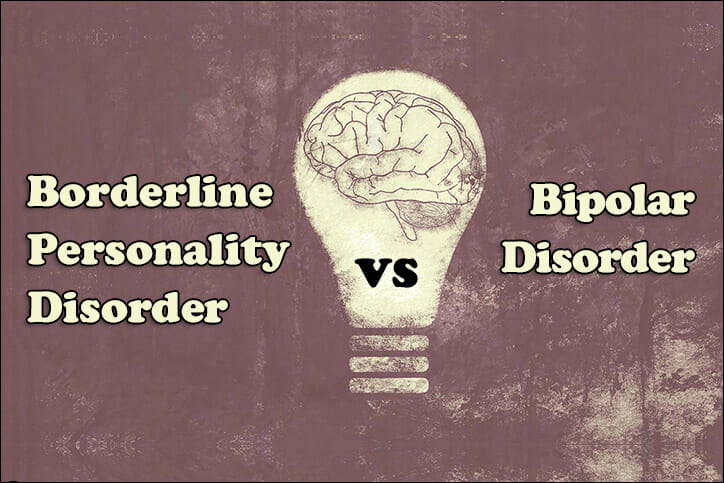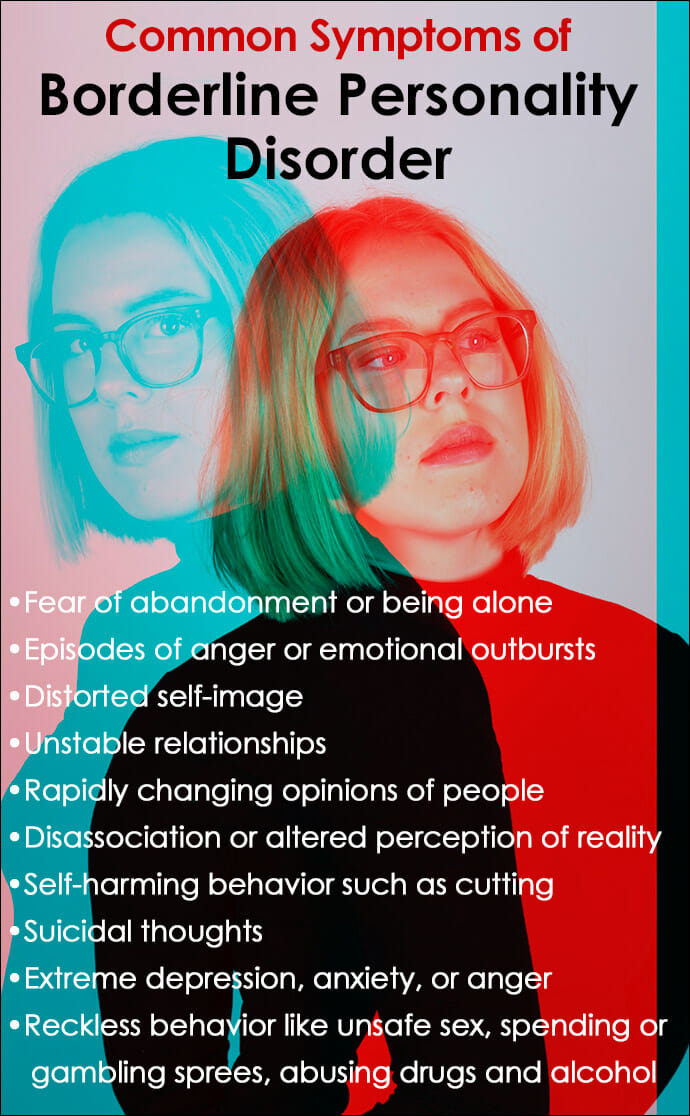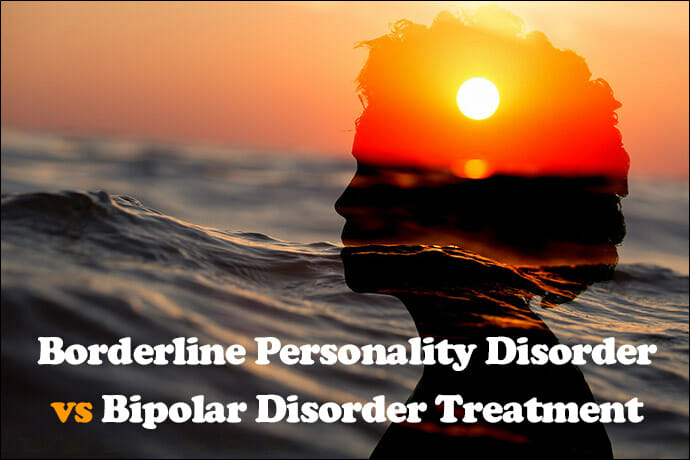It can be easy for people to confuse the difference between Borderline Personality Disorder vs Bipolar Disorder because they share some similarities and symptoms even though they are different conditions.
The biggest distinction separating the two is Borderline Personality Disorder (BPD) is a personality disorder as the name implies, whereas Bipolar is a mood disorder, so the treatments won’t be entirely the same for each one.
Receiving a correct diagnosis of Bipolar vs BPD is necessary for successfully treating each condition and properly managing the symptoms for people to find relief.
May is Borderline Personality Disorder Awareness Month, so it’s a good time to learn about the difference between BPD vs Bipolar Disorder.
What is Borderline Personality Disorder?
As a specific type of personality disorder, Borderline Personality Disorder affects the way a person thinks about themself and others. A person with BPD tends to act and relate to others differently compared to people without the disorder.
This type of mental health disorder causes a continuing cycle of changing moods, behaviors, and self-image, all of which typically lead to a pattern of unstable, troubled, and tumultuous relationships.
The average onset of BPD tends to be early adulthood, with many people, especially those who seek treatment, getting better as they age and learn to cope with the condition.
According to the National Institute of Mental Health (NIMH), an estimated 1.4 percent of adults in the United States experience BPD in a given year.
Borderline Personality Disorder Symptoms
Being able to identify and understand borderline personality disorder symptoms can be crucial in seeking the proper treatment.
For friends, loved ones, or professional colleagues of a person with BPD, recognizing the patterns of the disorder might also lessen some of the frustrations brought on by its associated behaviors.
Common BPD Symptoms can include:
- Intense fear of abandonment and difficulty being alone
- Frequent episodes of inappropriate anger, impulsiveness, or emotional outbursts that push others away
- Unbalanced sense of self or a distorted self-image
- History of intense or unstable relationships with family, friends, and others that regularly alternates between intimacy and love, to hatred or anger
- Rapidly changing opinions of people, believing them to be a friend in one moment and an enemy in another
- Disassociation, such as not feeling real or having the perception that a person is seeing themselves from outside their own body
- Self-harming, such as cutting, burning, or overdosing on drugs
- Suicidal thoughts
- Extreme episodes of depression, anxiety, or anger
- Reckless behavior, such as having unsafe sex, going on spending or gambling sprees, abusing drugs and alcohol, or driving while intoxicated
People with borderline personality disorder might not experience all of these symptoms, and while some may experience only minor issues, others may deal with much more intense symptoms of BPD.
Related: 9 BPD Movies About Borderline Personality Disorder
What is Bipolar Disorder?
As opposed to a personality disorder, bipolar is a mood disorder, which is a type of mental health condition that creates severe changes in mood.
Bipolar Disorder is more common than BPD, with an estimated 2.8 percent of the population who cope with bipolar disorder, as reported by the National Alliance on Mental Illness (NAMI).
With this form of mental health condition, a person’s ability to function, their thought patterns, energy levels, and mood are affected in cycles that can last for days, weeks, or months.
Those with bipolar disorder will alternate between intense depression and manic episodes, interspersed with periods of mood stability.
Manic episodes tend to last for up to a week and can be so serious that a person may require hospitalization.
Episodes of depression tend to last around two weeks. Those diagnosed with Bipolar II suffer the same bouts of depression, although they deal with what is referred to as hypomania, which is a less severe type of mania.
Related: 10 Famous People and Celebrities With Bipolar Disorder
Bipolar Disorder Symptoms
Like all other mental illnesses, being able to recognize the signs and symptoms of bipolar is important for seeking treatment.
Additionally, for anyone concerned about a person struggling with bipolar disorder, it can help to provide understanding and compassion.
Bipolar Disorder Symptoms During Mania Can Include:
- Severely elevated mood, combined with a grandiose sense of confidence and optimism
- Extremely high levels of energy, and the ability to go with very little sleep for days on end
- Impulsive, reckless, and dangerous behavior or decisions
- Racing speech and thoughts
- Changing moods, from irritability and anger, to severe depression
- Delusions and hallucinations in extreme episodes of mania
Bipolar Symptoms During Depressive Episodes Often Include:
- Overwhelming feelings of worthlessness, guilt, and hopelessness
- Ongoing fatigue combined with aches and pains
- Difficulty concentrating or making even minor decisions
- Loss of interest in activities or people normally cherished
- Constant worry and anxiety
- Sleep irregularities, from being unable to sleep, to sleeping an abnormal amount of time
- Withdrawal from social activities and relationships
- Suicidal thoughts and ideations
Similarities Between Borderline Personality Disorder vs Bipolar
One of the immediate similarities between borderline personality disorder and bipolar is the unstable and shifting nature of mood.
With both conditions, people experiencing symptoms can have severe changes in mood.
BPD and bipolar are also both associated with reckless and dangerous behaviors such as abusing drugs and alcohol, or putting oneself or others in danger.
Differences Between BPD vs Bipolar
Considering the differences between borderline personality disorder vs bipolar, the two conditions stand apart in ways that may seem nuanced, but are actually quite distinct.
When it comes to shifts in mood, people living with bipolar disorder tend to experience mania, hypomania, or depression. With BPD, mood shifts are more related to a sense of emptiness or outsized emotional pain, anger, or loneliness.
The duration that these episodes last also differs, with mood shifts in those with BPD being much shorter than in those with bipolar disorder.
Additionally, the causes of mood changes will vary between the two conditions.
With borderline personality disorder, a stressful event may trigger shifts in mood, while with bipolar disorder, the mania or depression can seemingly appear for no reason at all.
Lastly, with borderline personality disorder, there is no extreme elevation in mood that people with bipolar usually experience. Generally, a person living with borderline personality disorder will go from feeling okay to feeling bad.
Borderline Personality Disorder vs Bipolar Treatment
One of the primary differences between treating BPD vs Bipolar is that are no Food and Drug Administration (FDA) approved drugs to specifically treat borderline personality disorder.
However, there are some medications that can treat the “symptoms of BPD.”
Borderline Personality Disorder Treatment
- Medications can treat the symptoms but not the disorder
- Individual therapy
- Group therapy
- Dialectical Behavioral Therapy
- Cognitive Behavioral Therapy
- Avoiding drugs and alcohol
Individual, as well as group therapy, is a common treatment approach for people living with BPD.
Dialectical Behavioral Therapy (DBT) is an evidence-based therapy that was created to treat personality disorders, and it teaches people mindfulness and acceptance, combined with learning how to monitor their current emotional state.
Dialectical Behavioral Therapy may also be useful in helping those with BPD improve or maintain relationships, manage intense emotions, and reduce instances of self-harm.
Cognitive Behavioral Therapy (CBT) can help people adjust their core perspective of the world, their place in it, and manage behavior that arises out of those beliefs. CBT is also a useful therapy approach for learning how to better maintain relationships and deal with mood related issues.
Bipolar Disorder Treatment
- Mood stabilizing medications
- Psychotherapy
- Cognitive Behavioral Therapy
- Avoiding drugs and alcohol
- Healthy eating
- Regular exercise
- Practicing mindfulness
For treating bipolar disorder, a combination of therapy, such as Cognitive Behavioral Therapy, combined with mood stabilizing medications to balance highs and lows is recommended.
It usually takes time, but people with bipolar disorder can learn to self-manage their condition with a combination of medication and therapy.
People living with bipolar disorder also greatly benefit from living a healthy lifestyle, avoiding drugs and alcohol, exercising regularly, and practicing mindful meditation, yoga, and other stress-reducing activities.
Diagnosing BPD vs Bipolar
As outlined here, there are some similarities and differences between borderline personality disorder vs bipolar, with the main difference being BPD is a personality disorder and bipolar is a mood disorder.
Both conditions can be stressful and challenging to live with, especially when they go undiagnosed. Unfortunately, many people resort to using drugs or alcohol to cope with the symptoms, and this usually makes matters worse.
Over time, substance use combined with a mental health issue like BPD or bipolar can result in a co-occurring disorder that requires dual diagnosis treatment.
The good news is BPD and bipolar can both be managed with proper treatment.
For anyone struggling with either condition, it’s necessary to get an accurate diagnosis first in order to receive the most appropriate treatment for successfully managing the symptoms.
After a diagnosis has been made, closely following the recommended treatment every day and sticking with it will offer the best chance of recovery.
With treatment, it’s possible for anyone to live a happier and healthier life with BPD or bipolar disorder.






